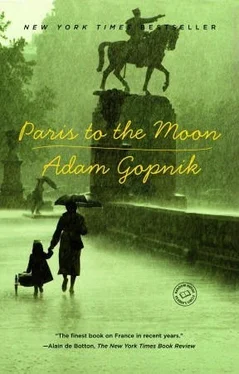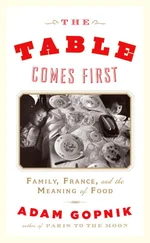* * *
I was so overtaken by the excitement of the strike and the action, and then I was so happily filled with a sense of moral indignation, and self-righteous pleasure, that I kept away from the Balzar, and for a while I didn’t miss it at all. As generations of French revolutionaries have discovered, moral self-righteousness is a very good short-term substitute for pleasure, but it wears out. Now I realize that the Balzar still exists on the rue des Ecoles and that I have lost it for good, and I think about the light coming in on a spring night, and the way the waiters took the food from the oval platters to the circular plates, and the simple poulet roti , and how good it all was, and I miss it all the time.
When we discovered that the child we were going to have in Paris last fall would be a girl—we already have a boy—everybody told us that we had been blessed with the choix du roi, the king’s choice. “Why, it’s the choix du roi!” the technician said as she looked at the sonogram, more or less in the tone of the host on Jeopardy! announcing the Daily Double. “It’s the choix du roi!” said the woman in the two-hour photo place on the rue du Bac when we told her. “A little girl coming after a little boy?” said my friend Pascal, the philosopher, with evident pleasure. “Why, then, it’s the choix du roi!”
Martha was delighted to be having a girl, however the king felt about it. She had always wanted a son and a daughter, and as she only now explained to me, one of the reasons she had been so eager to leave New York four years earlier, just after the birth of our son, was that all her friends there who had two children had two boys, and she was starting to believe that two boys were just one of the things that happened to women in New York, “like high-intensity step classes and vanilla Edensoy,” as she put it. Also, she said, she was worried about having to succumb to the New York social law that compels you nowadays to name your sons exclusively after the men your grandfather used to take a shvitz with. In our New York circle of under-tens we already had, in addition to the requisite Maxes, a Harry, a Joe, a Sam, an Otto, and a Charlie—the whole senior staff of Benny’s Market: Lowest Prices in Town. “Even if I had had another boy, at least in Paris I wouldn’t have had to call him Moe,” she explained.
I was pleased by the news too, of course, but a little mystified by the expression. To be brutally frank, what mystified me was why a king would choose to have any girls at all. If I were a king, I would want only boys, so that the succession would never be challenged by the sinister uncle with a mustache lurking behind my throne. Or only girls and an immortality pill. What puzzled me even more was the way the phrase, though you heard it on Parisian lips, had a slightly disconcerting air of peasants-in-the-spring ecstasy about it, the kind of thing (“C’est le choix du roil”) you would expect to hear set to a Trenet tune and sung by the villagers in a Pagnol film when the baker’s daughter gives birth to little Lisette.
I soon sensed, though, that while people meant it, they also didn’t mean it, that it was a thing you said both as a joke and not as a joke. After four years in Paris I have come to realize that this is where the true cultural differences reside: not in those famous moments when you think that a joke was meant straight (“My goodness, the dessert grand-mere is not made by Grandmother!”), or you misunderstand something that was meant straight as a joke (“The tete de veau is actually the head of a calf!”), but in those moments when you are confronted with something that is meant both as a joke and seriously. This zone of kidding overlaid with not kidding is one that we know at home. When a New Yorker passes out cigars in the office after the birth of his child, for instance, he is both making a joke about passing out cigars—with unspoken but quickly grasped reference to all the episodes of Bewitched and I Love Lucy in which Darrin or Desi or some other fifties-ish father passed out cigars—and sincerely celebrating the birth of his child. (The proof of this doubleness is that the cigars he passes out will actually be good to smoke, while mockery would make do with a bad or unsmokable cigar. Nobody tried to eat Warhol’s soups.)
In Paris, the obstetricians all wear black. When your wife goes to be examined, the doctor who comes out into the waiting room is not a smart Jewish girl in a lab coat, as in New York, but a man with a day’s growth of beard, who is wearing black jeans and a black silk shirt, like a character in a David Mamet play about Hollywood producers.
I first became aware of this when we went to get the first of many sonograms of the new baby. The sonogramist we had been sent to performs in a nineteenth-century apartment in the Sixth Arrondissement, with wainscoting and ceiling moldings and windows that open like doors. A curtain was drawn across one half of the living room, and couples sat on two sofas in the other half, turning the pages of Elle (Elle is a weekly in France) and waiting to be called.
After about ten minutes the curtain parted, and the sonogram specialist came into the room. He had on black jeans and a black silk shirt, open at the front and plunging down toward his navel, sleeves rolled up to the elbows. A day-old growth of beard covered his face. He smiled at us and asked us to come in. We sat down in front of a handsome Louis XV desk—the sonogram equipment was over in the other corner of the office—and he asked us when the baby had been conceived. My wife gave him the likely date.
“Was that at night or early the next day?” he asked. It took me a moment to realize that he was kidding, and then another moment to realize that he was not, and then still another moment—the crucial cultural gap moment—to realize that he was neither kidding nor not kidding. That is to say, he was kidding—he knew that it didn’t matter—but he was not kidding in the sense that he was genuinely interested, considered that it was part of his profession to view that precise moment of passion or lust with a special tenderness. The moment of conception, the sexual act, was, in his schema, not incidental information to be handled discreetly or pushed aside altogether, as American obstetricians do—all American “What to Expect” books begin with the test, not the act—but the prime moment, the hallowed moment, the first happy domino that, falling, caused all the other dominoes that had brought the three of us together to fall, and (his eyes implied) it was our special shared knowledge that that domino had not in fact fallen but had been nudged, deliberately, and by us. Then he asked Martha to get undressed. There was, to my surprise, no changing room or even a curtain, so she did, like that. (I was the only embarrassed person in the room.) The elaborate hospital rigmarole of American hygiene and American obstetrics—the white coats, the dressing rooms, the lab gowns—is dispensed with. They make no sense, since a pregnant woman is not only not sick but in a sense has doubled the sum of her health.
We looked at the baby on the sonar screen, as though she were a character in a Tom Clancy novel. “She’s pretty,” he said at last. Then we got a package of fifteen or so pictures of our daughter in embryo, full of allure, as the receptionist said. The pictures were stapled, in neat, ruffled rows, into a little wallet, with sans serif lowercase type, like an e. e. cummings poem.
“In New York the obstetricians all wear white, and they all have books out,” Martha said to me one afternoon. She had called up an obstetrician in New York that day, before her appointment with her French doctor. “She covered me with congratulations, and then she told me all these tests I ought to take. Week ten the CVS, then in week fourteen an early amnio, and then in weeks eighteen to twenty a targeted ultrasound to test for neural tube defects, and then I’m supposed to get genetic carrier blood tests for all these other things.”
Читать дальше












